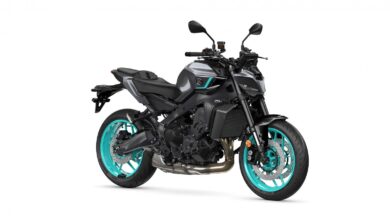Preowned, but with a guarantee – September 25, 2006
Suzuki is set to become the first Japanese powersports manufacturer to provide a certification program for preowned vehicles, a program used extensively in the auto industry.
The program, set to launch next month, is geared toward elevating Suzuki-brand street motorcycles and scooters to a more prominent level of preowned vehicle in consumers’ eyes by taking the risk out of the purchase.
If a vehicle qualifies for the Suzuki Select Certified program, it will carry a 90-day warranty and a 90-day roadside assistance plan.
For the consumer, “the risk is out of the equation,” Bob Mueller, sales development manager for American Suzuki Motor Co., told Powersports Business. “You can ride it in confidence knowing that it’s in good condition and it has passed a strict test that is backed up by warranties.”
The new program will be announced at Suzuki’s dealers meeting Sept. 24-26 in Las Vegas. It’s not the first of its kind in the industry as Arctic Cat started a similar program for ATVs about three years ago.
But Suzuki believes the new program will provide dealers with a new profit opportunity and potentially give the OEM and the dealer an earlier relationship with a future new bike buyer.
“The dealer’s first going to have decide whether he wants the bike Suzuki Select Certified because it may take some reconditioning, and he’s going to have to evaluate whether that’s worth his investment,” Mueller said.
To become Suzuki Select Certified, the following must occur:
“If he can’t get that $150 out of (the sale in profit margin) or even quite a bit more than that, I’d be shocked,” Mueller said of the dealer’s cost. “That extra $150, of course, is bringing that customer a quality inspection and warranties that he wouldn’t otherwise have on a used bike.”
That inspection process is “probably more than most dealerships do for their used bike inspections, but not a whole lot more,” Mueller said. He said much of the inspection is visual, checking for fender, chrome or saddle scratches or dents. But it also will include replacing the fuel and oil filters, inspecting the radiator, putting the suspension back to factory settings as well as a number of other services.
How much more would a Suzuki Select Certified bike be worth in comparison to the typical preowned bike? Mueller said Suzuki can’t provide that answer since there’s no history for such sales.
To push the program, Suzuki is offering point-of-purchase materials, including hanging tags, brochures, 2 foot by 3 foot posters and headlamp stickers that will designate the vehicle as Suzuki Select Certified. The program also will be detailed to consumers on the Suzuki Web site in the future. However, separate co-op advertising will not be available for the program, Mueller said.
Dealers will be able to upsell the extended protection from 90 days to 12 months, 24 months or 36 months.
To run the program, the dealer must be a franchised Suzuki dealer and adhere to several requirements. One of those requirements is meeting a certain survey service score. Suzuki dealers receive three consumer satisfaction index scores derived from two consumer surveys. One of those surveys concentrates on a dealership’s service performance. If the dealership’s service score is 10 percent below the national average, the store cannot participate in the Suzuki Select Certified program, Mueller said.
“We don’t want the guy that’s terrible at satisfying service customers performing an inspection on something that becomes a certified bike,” he said.
Will Suzuki consider extending the certified program to ATVs in the future?
“Probably not,” Mueller said. “ATVs get beat up more.”
Plus, he said ATVs can be more expensive to recondition and extended protection contracts are often more expensive. psb




